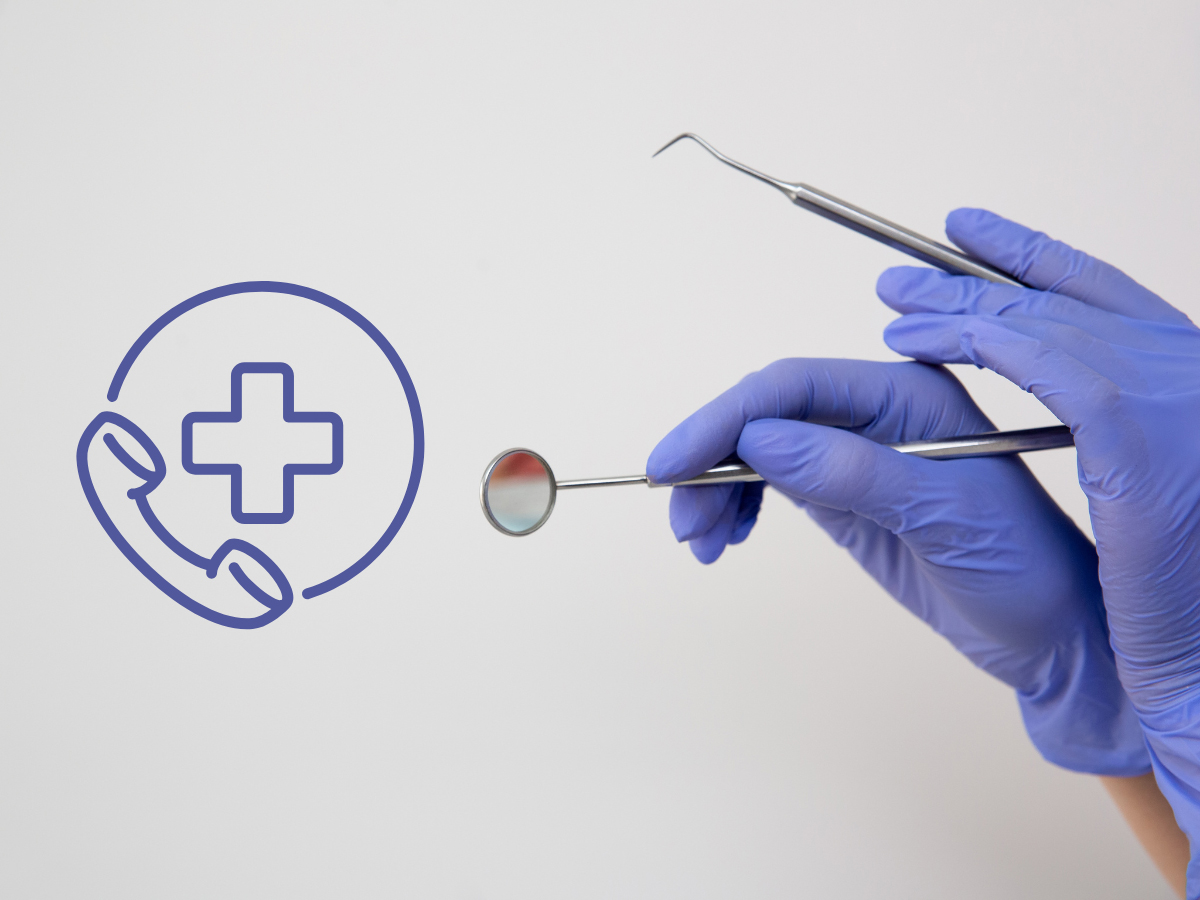Welcome to the King Street Dentistry Blog!
Stay informed, inspired, and empowered with our latest dental health tips, expert advice, and smile care insights. Whether you're looking for guidance on oral hygiene, cosmetic treatments, family dentistry, or the latest advancements in dental care, our blog is here to help you make confident, informed decisions about your oral health.
Explore our latest posts and keep your smile healthy and bright!
Emergency Dentist First Aid: Essential Steps Before Care
July 14, 2025 / Dentistry

Dental emergencies can happen at any moment
Dental emergencies can happen at any moment, often when you least expect them. While seeking care from an emergency dentist remains the ultimate priority, knowing proper first aid steps can make a significant difference in outcomes. These essential measures help manage pain, prevent further damage, and potentially save teeth before professional treatment becomes available.
Immediate Steps Before Seeing an Emergency Dentist
Knocked-Out Tooth Protocol
When a tooth gets completely knocked out, time becomes critical before reaching an emergency dentist. First, locate the tooth and handle it carefully by the crown, never touching the root surface. Gently rinse the tooth with clean water if it's dirty, but avoid scrubbing or removing any tissue fragments.
Next, attempt to reinsert the tooth into its socket if possible. Have the patient bite down gently on a clean cloth to hold it in place. If reinsertion isn't feasible, store the tooth in milk or saliva. These solutions help preserve the tooth's viability until an emergency dentist can provide treatment.
Managing Severe Toothache
Intense dental pain often signals a serious problem requiring an emergency dentist. However, immediate pain management can provide temporary relief. Start by rinsing the mouth with warm salt water to reduce swelling and clean the area around the affected tooth.
Over-the-counter pain medications like ibuprofen can help manage inflammation and discomfort. Additionally, applying a cold compress to the outside of the cheek for 15-20 minutes can reduce swelling. Avoid placing aspirin directly on the gums, as this can cause tissue damage.
Emergency Dentist First Aid for Broken Teeth
Immediate Care Steps
When a tooth breaks or chips, quick action before seeing an emergency dentist can prevent additional damage. Rinse the mouth with warm water to clean the area and remove any loose fragments. Save any broken pieces in milk or saliva for potential reattachment.
Apply gauze to any bleeding areas and maintain gentle pressure until bleeding stops. Furthermore, cover sharp edges with dental wax or sugar-free gum to protect the tongue and cheeks from cuts. Cold compresses applied externally can help manage swelling and pain.
What to Avoid
Certain actions can worsen the situation before reaching an emergency dentist. Never attempt to file down sharp edges yourself, as this can cause irreversible damage. Avoid eating hard or sticky foods that could cause further breakage. Additionally, don't ignore the injury, even if pain seems minimal initially.
Handling Dental Trauma Before Emergency Dentist Care
Controlling Oral Bleeding
Significant bleeding from dental trauma requires immediate attention before seeing an emergency dentist. Apply clean gauze or a damp tea bag to the bleeding area with firm, steady pressure. Tea bags contain tannins that help promote blood clotting naturally.
If bleeding persists after 15 minutes of continuous pressure, seek immediate medical attention. Meanwhile, have the patient sit upright and lean slightly forward to prevent swallowing blood. Swallowing large amounts of blood can cause nausea and vomiting.
Soft Tissue Injuries
Cuts to the lips, tongue, or cheeks often accompany dental emergencies. Clean the area gently with water and apply direct pressure with clean gauze. Ice can help reduce swelling, but avoid applying it directly to the skin. Instead, wrap ice in a thin cloth before application.
Pain Management While Waiting for Emergency Dentist
Safe Medication Options
Proper pain management helps patients remain comfortable while waiting for an emergency dentist. Ibuprofen works particularly well for dental pain because it reduces inflammation in addition to providing pain relief. Follow package directions carefully and don't exceed recommended dosages.
Acetaminophen can supplement ibuprofen for additional pain control. However, avoid combining multiple medications without professional guidance. Never give aspirin to children under 16 years old due to the risk of Reye's syndrome.
Natural Pain Relief Methods
Several natural approaches can complement medication before seeing an emergency dentist. Clove oil contains eugenol, a natural anaesthetic that can temporarily numb dental pain. Apply a small amount to a cotton ball and place it gently against the affected tooth.
Salt water rinses help reduce bacteria and inflammation in the mouth. Mix half a teaspoon of salt in warm water and rinse gently. Additionally, keeping the head elevated while resting can help reduce blood flow to the affected area and minimize throbbing pain.
When to Contact an Emergency Dentist Immediately
Signs Requiring Urgent Attention
Certain symptoms indicate the need for immediate emergency dentist care without delay. Severe, uncontrollable pain that doesn't respond to over-the-counter medications requires professional intervention. Similarly, significant facial swelling, especially around the eyes or throat, can indicate a serious infection.
Fever accompanying dental pain suggests a systemic infection that needs prompt treatment. Additionally, difficulty swallowing or breathing requires immediate emergency care, as these symptoms can indicate a life-threatening situation.
Preparing for Your Emergency Visit
Before heading to see an emergency dentist, gather important information to expedite treatment. Bring a list of current medications, including dosages and frequency. Also, note when the injury occurred and what caused it, as this information helps guide treatment decisions.
If possible, bring any broken tooth fragments or dental appliances that were damaged. Furthermore, contact your dental insurance provider to understand coverage for emergency treatments. This preparation helps ensure smooth, efficient care when you arrive.
Final Thoughts
Knowing proper first aid steps before reaching an emergency dentist can significantly impact treatment outcomes and patient comfort. These immediate care measures help stabilize the situation, manage pain, and preserve dental structures until professional treatment becomes available.
However, first aid should never replace professional dental care. While these steps provide temporary relief and damage control, only an emergency dentist can provide definitive treatment for dental emergencies. For residents of Cambridge, Ontario, King Street Dentistry offers emergency dental services and can be reached at 519-219-6363 when urgent dental care is needed.
Need a Dentist Near Me Right Now? Emergency Guide
June 12, 2025 / Dentistry

When dental pain strikes unexpectedly, finding a dentist near me becomes an urgent priority.
Dental emergencies don't follow convenient schedules, and knowing how to respond quickly can make the difference between saving and losing a tooth. This comprehensive guide helps patients navigate emergency dental situations and locate immediate care when they need it most.
Common Emergencies: When to Find a Dentist Near Me
Severe Toothache
A sudden, intense toothache often signals a serious underlying problem. When searching for a dentist near me for severe pain, patients should seek immediate attention. Meanwhile, over-the-counter pain relievers and cold compresses can provide temporary relief. However, these measures don't address the root cause of the problem.
Knocked-Out Tooth
Time is critical when a tooth gets knocked out completely. Patients need to find a dentist near me within 30 minutes for the best chance of saving the tooth.
- First, gently rinse the tooth with water without scrubbing the root.
- Then, try to reinsert it into the socket or store it in milk while seeking emergency care.
Broken or Chipped Teeth
Fractured teeth require prompt attention to prevent further damage. When looking for a dentist near me for broken teeth, patients should:
- Save any tooth fragments
- Rinse their mouth with warm water
- Use cold compresses to reduce swelling until treatment is available
How to Quickly Locate a Dentist Near Me
Online Search Strategies
Modern technology makes finding a dentist near me faster than ever. Search engines provide instant results for emergency dental services in your area. Additionally, many dental practices maintain websites with emergency contact information and after-hours protocols.
Dental Practice Emergency Lines
Most established dental offices offer emergency contact numbers. When patients need a dentist near me outside regular hours, these dedicated lines connect them with on-call professionals. Furthermore, many practices partner with emergency dental services to ensure continuous coverage.
Hospital Emergency Departments
While hospitals can't perform complex dental procedures, they provide pain management and antibiotics for severe infections. However, patients should still follow up with a dentist near me for definitive treatment. Emergency rooms serve as a temporary solution until proper dental care is available.
What to Expect from Your Emergency Dentist Near Me
Initial Assessment
Emergency dental visits begin with a thorough examination to determine the extent of the problem. The dentist near me will assess pain levels, examine damaged teeth, and take necessary X-rays. This evaluation helps prioritize treatment and develop an appropriate care plan.
Pain Management
Immediate pain relief is often the first priority in emergency dental care. Dentists use various methods to manage discomfort, including local anaesthetics and prescription pain medications. Subsequently, they address the underlying cause of the pain through appropriate treatment.
Treatment Options
Emergency treatments vary depending on the specific problem. A dentist near me might perform:
- Temporary fillings
- Root canal therapy
- Tooth extractions
In some cases, they may provide temporary solutions until more comprehensive treatment can be scheduled.
Preventing Future Searches for Emergency Dentist Near Me
Regular Preventive Care
Consistent dental check-ups help identify problems before they become emergencies. Patients who maintain regular appointments with a dentist near me often avoid urgent situations. Moreover, preventive care costs significantly less than emergency treatments.
Protective Measures
- Wearing mouthguards during sports
- Avoiding hard foods
- Not using teeth as tools to open packages or crack nuts
These simple precautions reduce the likelihood of needing emergency dental care.
Good Oral Hygiene
Daily brushing and flossing prevent many dental problems that could lead to emergencies. Furthermore, using fluoride toothpaste and limiting sugary foods support long-term oral health. Patients who maintain excellent oral hygiene rarely need urgent dental care.
Cost Considerations for Emergency Dental Care
Insurance Coverage
Many dental insurance plans cover emergency treatments, though coverage varies by provider. Patients should verify their benefits before seeking care from a dentist near me. Additionally, some plans require pre-authorization for certain emergency procedures.
Payment Options
Emergency dental care can be expensive, but many practices offer payment plans or financing options. When cost is a concern, patients should discuss financial arrangements with the dentist near me before treatment begins. Some offices also accept credit cards or offer discounts for cash payments.
After-Hours and Weekend Dentist Near Me Options
Extended Hours Practices
Some dental offices extend their hours to accommodate emergency patients. These practices understand that dental pain doesn't wait for business hours. Consequently, they provide evening and weekend appointments for urgent cases.
Emergency Dental Clinics
Specialized emergency dental clinics operate outside traditional office hours. These facilities focus exclusively on urgent dental care and maintain staff specifically trained in emergency procedures. Patients can often find these services by searching for "emergency dentist near me" online.
Plan Ahead for Dental Emergencies
Dental emergencies require prompt attention and quick decision-making. Knowing how to find a reliable dentist near me during urgent situations can save teeth and prevent complications. While prevention remains the best strategy, having a plan for emergency dental care provides peace of mind.
Remember that dental pain often worsens without treatment, making early intervention crucial. Whether dealing with severe pain, trauma, or infection, seeking immediate care from a qualified dentist near me ensures the best possible outcome for your oral health.
For residents in Cambridge, Ontario, King Street Dentistry offers emergency dental services and can be reached by contacting us at 519-219-6363 when urgent dental care is needed.




